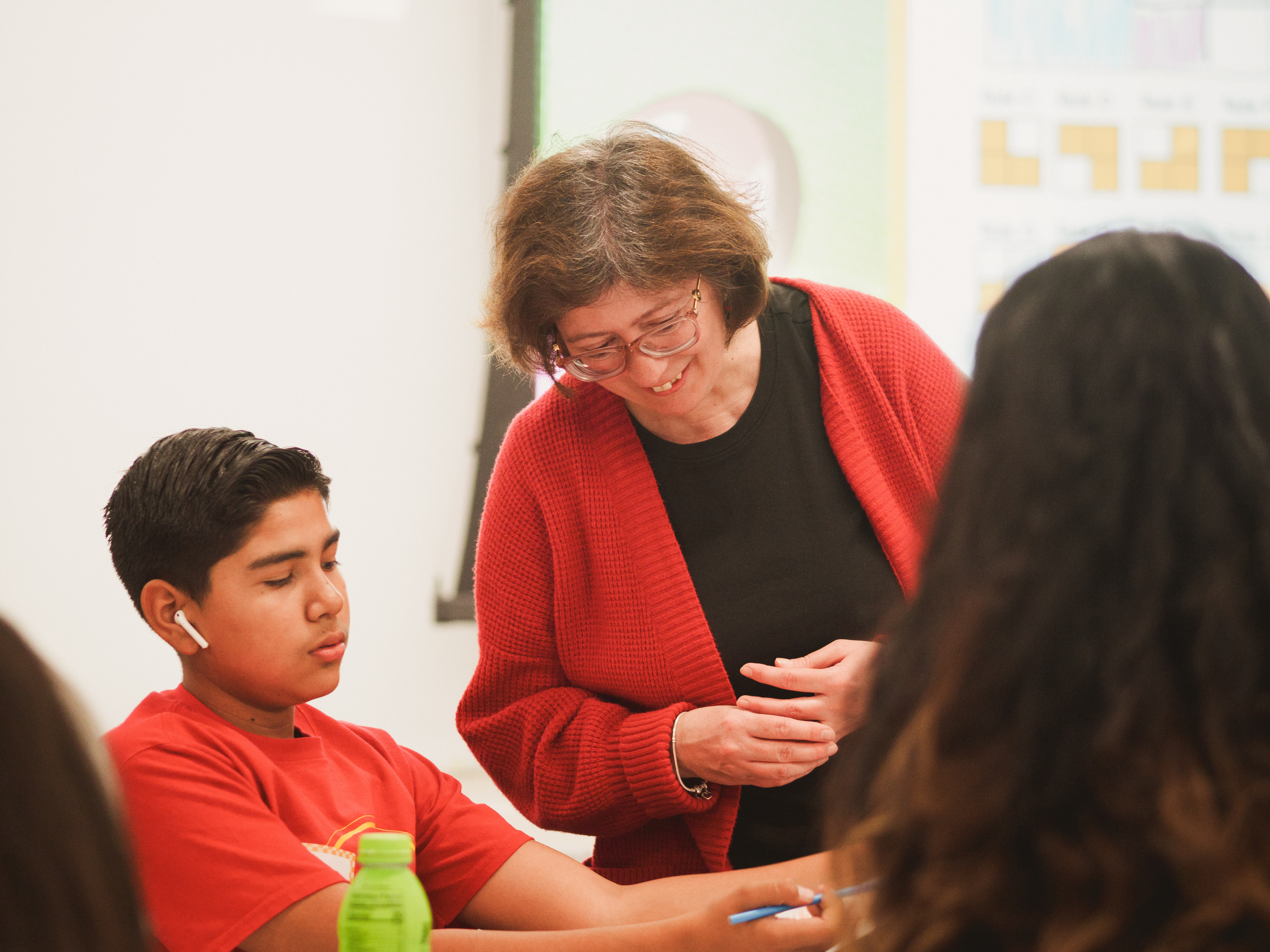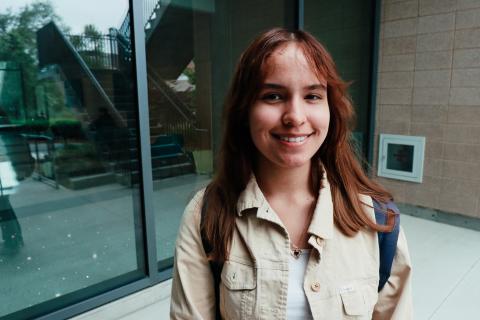Math CEO outreach program reveals best mentoring practices

Professor Alessandra Pantano of the UC Irvine Department of Mathematics helps mentor a student at a Math CEO event held in May 2024.
How do you best mentor young students in math?
It’s a question that’s always on the mind of Alessandra Pantano, professor of mathematics at UC Irvine, and director of Math CEO (short for Math Community Educational Outreach).
Pantano founded Math CEO alongside UCI Mathematics Professor Li-Sheng Tseng in 2014. The program hosts students from underprivileged schools in Southern California at UCI almost every week during the academic year so they can get tutoring from UCI undergraduate math mentor volunteers.
In 2022, Pantano and Professor Sandra Simpkin of the UCI School of Education received a $1.5 million grant from the National Science Foundation to support research into which factors are most important when it comes to helping kids learn math.
The research suggests that the most important factor in determining successful learning outcomes for math students is the quality of the relationship between a mentor and their mentee.
“You really have to pay attention to the training of the mentors,” said Pantano. “How do you show the middle school students you care about them? How do you develop a pedagogy that seizes the strengths of the students and leverages it?”
Math CEO mentors like Mercedes Barriga, a third-year math undergraduate studying to become a teacher, are finding the answers.
Barriga went to Lathrop Middle School in her home city of Santa Ana. She remembers how Math CEO volunteers visited her classroom and mentored her back in 2015.
In those early days, Math CEO mentors came and went and did not stick with one mentee for long. But now, as a mentor herself, Barriga makes it a point to stick with her mentees, and she sees the results. Barriga found that one of her mentees, a middle schooler named Ruth, had a shared interest: they both love the Korean pop band ENHYPEN.
Barriga and Ruth had different favorite members of the band, and Ruth would always ask Barriga if she’d finally changed her mind and decided that one of the members, named Heeseung, was in fact the best member of the group.
As they grew to know each other, Barriga saw Ruth develop more of a willingness to be open about math problems she struggled with. “I think having one mentor all the time helps with bonding with the kids,” said Barriga.
Since Math CEO started in 2014, it has evolved in deliberate ways guided by findings like those from the NSF-backed research. Beyond focusing on mentor-mentee relationships, the program strives to be cognizant of the cultural backgrounds of its students, many of whom come from Latinx backgrounds.
Barriga collaborated with the Math CEO leadership team to create a math activity that employs culturally specific themes, including a mathematical version of a Bingo-like game popular in Mexico called Loteria – an activity that’s often a hit with students.
“Students were excited to see a game they loved be utilized in the program,” said Barriga. “While they were competing against each other to get the most points, they still helped one another solve calculations and decide on the best strategies for winning.”
“The Loteria activity also explored some cultural aspects of the game, such as the images present on the boards,” Barriga added. “Students shared their knowledge about images like the Mexican flag and Mexican musicians called mariachis. They enjoyed discussing their culture and questioning why certain images were placed on the boards.”
Math CEO also encourages civic engagement education. During a recent visit to UCI, middle schoolers worked through math problems related to the fairness of a make-believe democratic election. With encouragement from mentors like Barriga, they had to figure out how an election could or could not be considered fair.
While the students studied election numbers, research assistants from Simpkins’ team went around the room with clipboards taking notes on the youths’ engagement with the math activities and on their interactions with college mentors – data that will help inform Pantano and Simpkins’ understanding of culturally responsive pedagogical practices in informal learning spaces.
“The experience of participating in a culturally responsive after-school program like Math CEO helps kids develop math-specific outcomes, including both math proficiency and math motivation, their problem-solving skills, their interest in math, their beliefs about how good they are at math and their feelings about how important math is,” said Pantano. “Youths also learn other helpful skills, such as working on a team or persisting during challenging tasks. Moreover, by working with college mentors on a college campus, youths gain familiarity with college and STEM careers.”
Professor Tseng has been working to build up the high school component of Math CEO, which launched in 2019. Tseng explained that the hope is to continue to foster math education in Math CEO middle schoolers by remaining in touch with them into high school and, hopefully, college.
“Part of our motivation is to raise awareness for college, and motivate students to do well, to think more about math and its myriad of real-life applications, and get interested in STEM fields,” said Tseng. “Math CEO seeks to engage students from 6th to 12th grade to provide a very welcoming, friendly atmosphere to explore many different aspects of mathematics, as a gateway to college. This program starts in middle school, and is moving toward this goal of building a bridge to college.”
Match CEO is already achieving that aim through students like Barriga, who was one of the first middle-schoolers to be a part of Math CEO.
“The weekly coaching sessions for mentors and the course material help college students learn about working with youth, solidifying their future plans, and helping them decide whether they would like to become teachers someday,” said Pantano. “The experience of mentoring youth at Math CEO also strengthens undergraduates' sense of contribution to the community.”
Upon graduating next year, Barriga said she may want to become a middle school teacher – possibly, she said, back at Lathrop, where her own Math CEO journey began.
“I’m just proud that I can help out,” said Barriga.

Math CEO has served 800+ students in underserved communities since 2014. The generous support of donors allow the program to continue providing math enrichment and college orientation at no cost to the low-income families. You can make a gift here.
